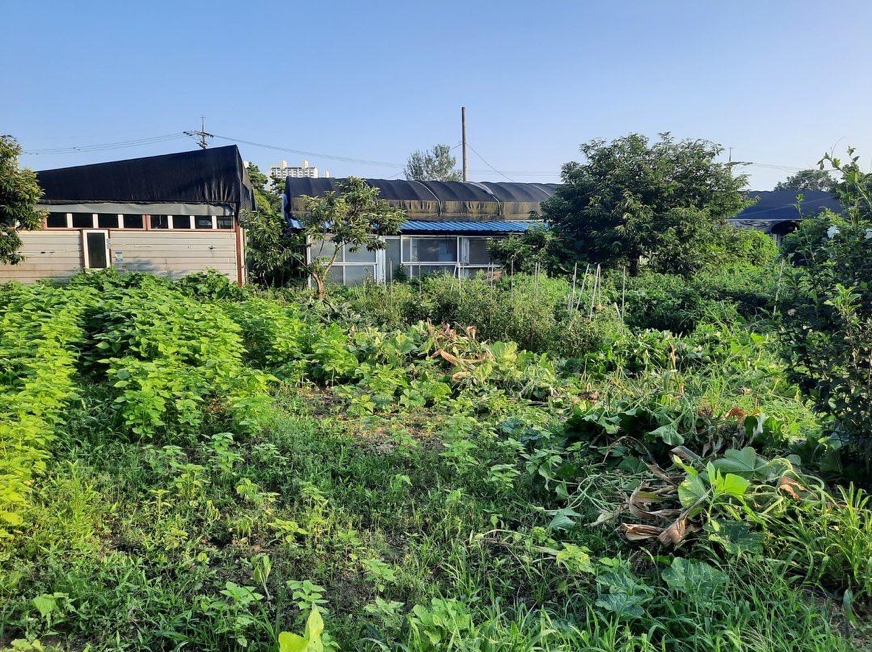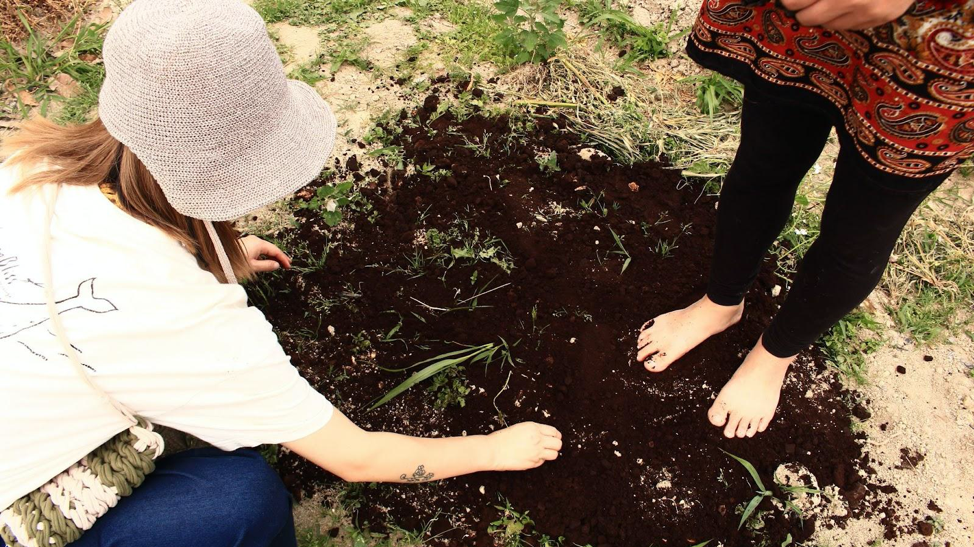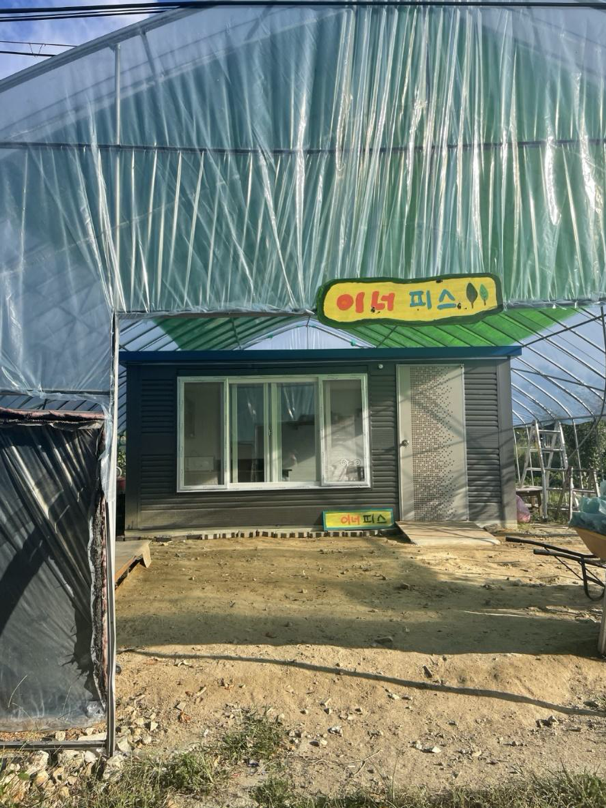Cultivating care: Exploring motivations and temporalities in an urban gardening community in Daejeon, South Korea
By Ilana Herold, Korea Advanced Institute of Science and Technology (KAIST)
As urban populations across the globe continue to increase, the changing relationship of these dense populations to the land and food systems that sustain them demands urgent consideration. In the context of global climate change and stressed agricultural resources, national and local governments are contending with the challenge of sustainably feeding their people. Yet, these policies are not “one-size-fits-all,” and certain voices, motivations, and values may be left out of urban agriculture promotion and policy formation. Drawing on my ethnographic field notes and interviews, for this post I examine the interaction of temporality and care in the practice of urban cultivators as they express their concerns about the climate crisis and attempt to farm in accordance with both ecological and human needs. In an ecofeminist community garden in Daejeon, South Korea, urban cultivation serves as a political expression of environmental concern, but actual practices within the garden follow the timelines of human cultivators, the crops they grow, and the natural systems that support that growth, all working in tandem.
Cultivation as a political action
The members of Farmer’s Forest (pseudonym) started their urban garden on the family land of Moka, a self-described “farmer’s daughter.” The land is within the city limits of Daejeon, South Korea (population roughly 1.5 million), but due to its location far from the bustling downtown, amongst other lifelong small-scale farming neighbors, it is fondly referred to as a “healing space” by Farmer’s Forest members. Formed as one venture of a larger ecofeminist non-profit, the community garden is in its second year, at Moka’s behest. Members include friends of Moka as well as young women recruited through the non-profit group’s Instagram account and online chatting groups for people interested in issues such as veganism, feminism, and environmental activism in the local Daejeon area. These women chose to join Farmer’s Forest rather than a government-operated community garden because they felt it offered a unique experience to learn together “ecologically” as a community and farm. The aim is not to farm for profit, but rather to grow just enough to feed themselves and share their harvest with the surrounding neighbors and friends when possible. Since the passage of The National Act on Development and Support of Urban Agriculture in 2011, national and local promotion of recreational public urban gardens has expanded throughout Korean cities. The act aims to develop “a nature-friendly urban environment by providing for matters regarding advancement and support of urban agriculture and to contribute to harmonious development of cities and rural communities by raising urban residents' understanding of agriculture.” In practice, the typical format of public urban gardens is an allocation of plots to single families or community groups, and there are limited opportunities for the separate groups to formally interact with one another. In contrast, one member explained that at Farmer’s Forest, the work goes beyond simply growing crops:
Farmer’s Forest is special because it brings people together who are pursuing the call of our slogan: “a life that does not push aside women, ecology and art.” Those goals are still a minority position in Korean society. It may be a small voice, but I think it’s important that people with these voices who share the same will are slowly but increasingly grouping up so that we can crack even a little bit into the established politics.
The nature of the group’s politics, as one founding member of the group explained, is “the climate crisis.” This means that the group recognizes that during the course of development and industrialization, the needs of both women and the natural world have been largely ignored. In the context of this understanding, cultivating an organic garden together as a community of women is simultaneously one step towards self-sufficiency and one way of taking care of the earth. Even beyond the personal motivation of “cultivating a garden ecologically” to alleviate the helpless feeling of living in an era of pressing ecological changes, the member continued to articulate, her dream is for others to be inspired by the group’s cultivation practice. For instance, she is connected to wide-reaching feminist groups and other independent community farms throughout Korea, attending workshops and farm stays where attendees learn together and subsequently bring new knowledge back to their own communities. Thanks to this network, visitors from around Korea with an interest in ecological gardening and growing food for those around them have also come to visit Farmer’s Forest, spreading the group’s influence beyond their immediate surroundings. A combination of shared environmental beliefs and political convictions, such as earning women’s issues a more prominent place in society, mean that cultivation is seen as a political action that sets an example of how to live a more sustainable life. In order to raise this voice, the group continuously shares their cultivation experience through social media, sharing photos, gardening tips, and vegan recipes, as well as organizing community events to spread environmental awareness and discuss feminist issues in Korea.
Cultivating and caring on garden time
The patience required in gardening may seem at odds with the urgency of the climate crisis, but, as one member explains: “everything has its own speed. Even if we’re not thinking about the crops just in terms of harvesting and eating them, seeing each crop’s unique appearance as they grow” helps her feel more connected to the land. As Maria Puig de la Bellacasa (2017) mentions, “looking at temporality from the perspective of everyday experience, time is not an abstract category, or just an atmosphere, but a lived, embodied, historically and socially situated experience” (pp. 175). Climate activism provides an overarching motivation, but it is these tangible connections to life as it grows that make their practice feel attainable.
Core to the Farmer’s Forest community practice is to rebuff strict goals and harvest quantities, focusing instead on the enjoyment of communal garden labor. It is necessary, they believe, not to feel discouraged or “weighed down” by the climate crisis, not to “lose our fun.” Items on their “to-do list” are often pushed back. Gardeners abide instead by the needs and temporalities of the season, such as ensuring that root vegetables are harvested before the rainy season. The group’s work in the garden is also informed by the physical needs and constraints of the gardeners themselves. If a member is struggling with the physical demands of gardening on a particular day, they may take a stronger role in cooking the day’s meal, or recording the group’s activities through photos and videos. Thus, the physical and emotional needs of the human members of the group are met, while still attending to the sprouting crops’ care requirements.
This kind of “ecological” gardening is in contrast to the push amongst governments and agri-business to technologically innovate, to feed more people, to make crops more resilient to climate variability, and to streamline production. The Korean government is, at the same time, encouraging local food production and consumption, and creating policies that expand access to urban agriculture (농림축산식품부a, 농림축산식품부b). Within the urban agriculture context, these policies follow two main strands, one focusing on funding high-tech “smart-farming” start-up and research ventures, and one centered on community gardening to increase urban school children and families’ understanding of agriculture and access to green spaces within cities.
Despite such policies, in everyday practice most urban Koreans do not (or are unable to) shop at local farmers’ markets or attend to their own garden allotments. These days, both independent small grocery marts and large chain stores offer a mix of Korean-grown and imported produce, and particularly since the start of the Covid-19 pandemic, ordering groceries online for home-delivery is also a common practice. Self-formed cultivation communities, like Farmer’s Forest, have an important role to play in teaching us about feeding ourselves while properly caring for the planet. These cultivators are resisting the current production-focused system and the timelines it imposes. In an age of overwhelming ecological crisis, our future depends on a better understanding of how planetary-scale threats are experienced and acted upon at community scales.
‘Care’ in research
“Care is a necessary practice, a life-sustaining activity, and an everyday constraint” (Puig de la Bellacasa 2017, pp. 160). These ideas are experienced firsthand when working in a garden and cooking with the ingredients you harvest, especially in a community setting. Keeping the garden alive requires careful attention and concern, the garden cares for us in return by providing sustenance and strength, and physical and emotional constraints guide the cultivation practice. The members of Farmer’s Forest care for the earth and their community loudly and proudly, organizing meetings with other local organizations, attending marches and protests, participating in interviews with the local press to raise awareness about their work. Although I cannot attend every event or raise my voice in the same way, I hope to some extent I can perform acts of care in small ways, such as offering to help more in the garden on a day when someone is tired, through offering a listening ear, and through being an active member of the community that has welcomed me so kindly.
Care is enacted not only through practice but also through knowledge production, and this is where researchers have a role to play. Moka, coming from a farming background and surrounded by friends and family who cultivate the land, was keen to engage with me because, as she articulated, “depending on what researchers do, it acts as a driving force that can change all of the many people who work in agriculture.” As a budding social scientist studying agricultural practices, it is my hope that through writing and public engagement, more people will consider critically how and where their food is grown. I hope to uplift the voices of ecofeminist communities like Farmer’s Forest to the extent I am able to, and in that way support them on their mission of growing more ecologically responsible food systems.
Image 1. Farmer’s Forest’s main community garden, prior to harvesting the summer crops and preparing the garden for fall planting.
Image 2. Harvesting potatoes. High-rise apartments are visible in the background, providing a stark contrast between the agricultural area in which Farmer’s Forest meets, and the fact that the location is still within the city of Daejeon.
Image 3. Eating and sharing vegan meals with others is a crucial component of the Farmer’s Forest community. This image is from the “Potato Party” (which was open to the public).
Image 4. Planting and feeling the earth barefoot at the “Planting Festival” marking the beginning of the spring planting season.
Image 5. Writing activity to reflect on our feelings throughout the day, during the Planting Festival. Ukulele is visible from the day’s concert.
Image 6. Newly built community gathering space. Sign reads “Inner Peace.”
Images are either taken by the author or the group members and are used here with the permission of the group.
References
Puig María de la Bellacasa. (2017). Matters of care: Speculative ethics in more than human worlds. University of Minnesota press.
도시농업의 육성 및 지원에 관한 법률. 법률 제14650호, 2017 일부개정. https://law.go.kr/lsSc.do?section=&menuId=1&subMenuId=15&tabMenuId=81&eventGubun=060101&query=%EB%8F%84%EC%8B%9C%EB%86%8D%EC%97%85#undefined
[Eng: Act on Development and Support of Urban Agriculture. Act No.14650, Partially Amended 2017. https://law.go.kr/LSW/eng/engLsSc.do?menuId=2§ion=lawNm&query=ACT+ON+DEVELOPMENT+AND+SUPPORT+OF+URBAN+AGRICULTURE&x=2&y=32#liBgcolor0]
농림축산식품부a. (n.d.). 분야별정책: 농촌분야. 지역 푸드플랜 기반 로컬푸드 활성화. Retrieved September 7, 2022, from https://www.mafra.go.kr/mafra/2710/subview.do
[Eng: Ministry of Agriculture, Food and Rural Affairs. (n.d.). Policies by sector: Rural and farming area sector. Promotion of local food based on local food plan. Retrieved September 7, 2022, from https://www.mafra.go.kr/english/2109/subview.do]
농림축산식품부b. (n.d.). 분야별정책: 농생명분야. 도시농업 활성화. Retrieved September 7, 2022, from https://www.mafra.go.kr/mafra/2097/subview.do
[Eng: Ministry of Agriculture, Food and Rural Affairs. (n.d.). Policies by sector: Agricultural science sector. Revitalization of urban agriculture. Retrieved September 7, 2022, from https://www.mafra.go.kr/english/2110/subview.do]






